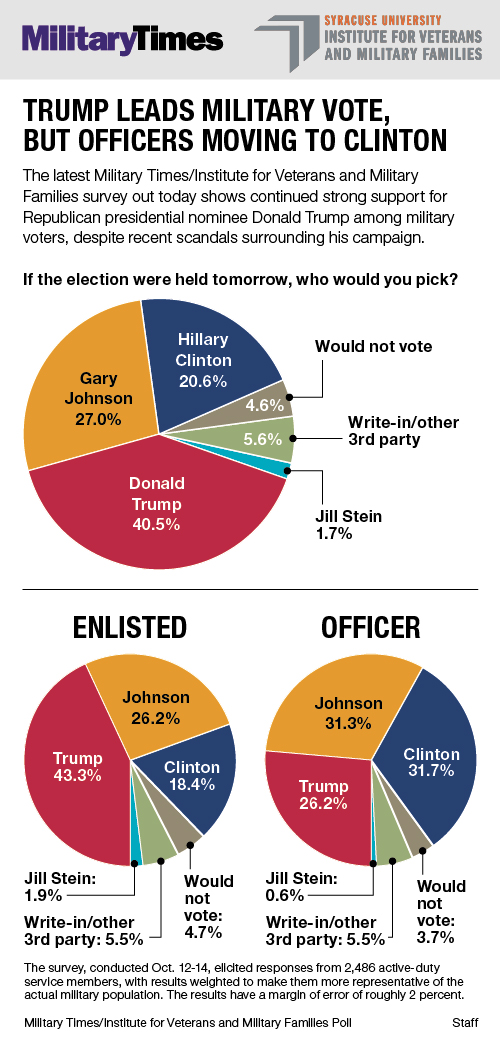Gary Johnson's 27% Showing in Another Military Poll Is a Warning Shot to Smug Interventionists
While civilian political elites police imperial manners, the boots on the ground are being mugged into libertarianism.


Last week Military Times and the Institute for Veterans and Military Families released another presidential poll among active-duty personnel, conducted Oct. 12-14. Donald Trump was the first choice among the nearly 2,500 respondents, at 41 percent (in the ballpark of his 39 percent or so nationwide), followed by Gary Johnson at 27 percent, Hillary Clinton at 21 percent, and Jill Stein at 2 percent.
The results show some slippage for Johnson from a month ago, when the same survey had the race 38-37-16-1, placing the Libertarian in a virtual tie with the Republican. But the fact that a third-party candidate with no particular foreign policy expertise is outpolling the likely next president among active military while exceeding his national averages by more than 400 percent should give Washington's default interventionists pause.
Instead, judging by this condescending Christian Science Monitor write-up (subhed: "A new poll shows Libertarian candidate Gary Johnson beating Hillary Clinton by 7 points among active military personnel, despite his proposals to cut military spending and a lack of foreign policy knowledge"), the only people that the political class deem ready for a re-think are the troops themselves. Don't these rubes understand that Johnson lacks the necessary sophistication?
[I]n an increasingly unconventional and divisive election with historically unlikeable major party candidates, some have chosen to shift from their partisan ties and jump to the other side of the aisle or put their vote toward a third party candidate.
But when that third party candidate has revealed a lack of knowledge of foreign policy, a surge in support for him becomes more difficult to expound.
"It's a little hard to explain, actually," Matthew Dallek, a professor at George Washington University's Graduate School of Political Management, tells The Christian Science Monitor.
"There's no kind of rational basis."
Nothing "rational" about the tip of the U.S. spear preferring a commander in chief who is less eager to go to war? Hard to explain the military polling success of a candidate who wants clearly defined missions, "peace through strength," and a reorientation toward actual defense? Methinks some professors and journalists should get out more.
Military support for politicians who are less hawkish than the Washington establishment is nothing new. As Brian Doherty pointed out in July, "back in the heart of the 2012 race in late February, Ron Paul was raising twice as much money as President Obama from active military and defense workers, and more than four times as much as the entire rest of the GOP field at the time." Turns out that seeing first-hand how D.C.'s perpetual game of Risk translates in the real world makes one susceptible to radically different ideas about how American power should be projected.
Over the years I have met dozens of young veterans who came to the ideas of libertarianism through the process of becoming skeptical about the War on Terror's overall mission. It is a far more common path, in my anecdotal experience, than, say, the fiction of Ayn Rand. Most were attracted at first by the words and presidential runs of Ron Paul (though you'll hear an occasional Rand Paul or Gary Johnson thrown in, as well as Reason magazine), and all share a searing intensity and intellectual curiosity as they seek to learn more and figure out how they might act on these ideas either in the service or out.
It should be a cause of sober reflection, even alarm, that as of less than a month before a presidential election, a third-party skeptic of intervention who's polling just north of 6 percent nationwide is nonetheless in a virtual tie for the lead among active-duty military officers. Instead, the political class mostly offers up warmed-over snickers about "Aleppo," mixed with digs at the troops' endemic sexism.
We should be clear-eyed about recognizing AleppoMania for what it is: A chance to avoid, not defend, foreign policy "seriousness," while aggressively marginalizing an admittedly flawed candidate who would dare challenge Washington's decades-long addiction to no-fly zones, "smart" war, and historical amnesia.


Show Comments (97)